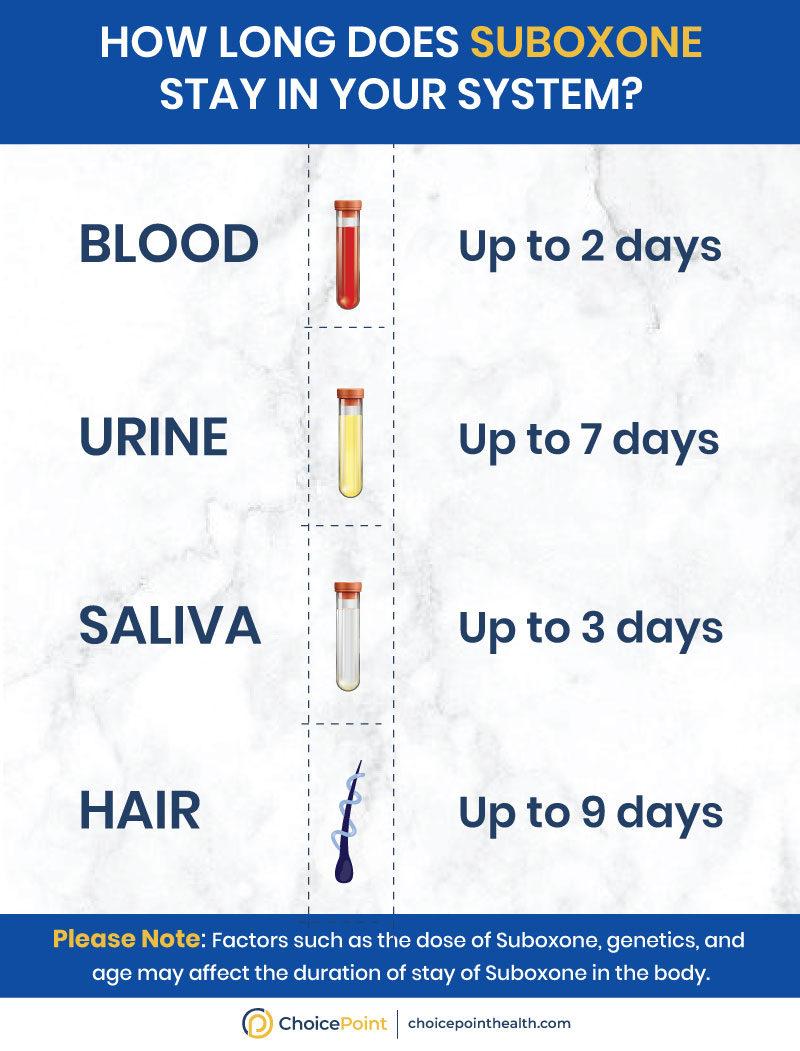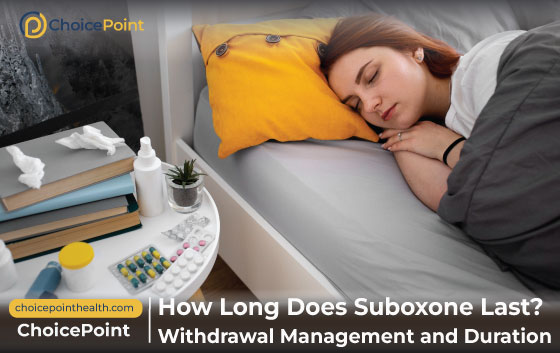Despite the great efforts being put at the State and federal level to combat the opioid crisis, the statistics continue to rise. One of the major reasons for this increase is misinformation, incomplete information, or assumptions regarding the use of medications to treat opioid addiction. Read on as we answer your questions about how long suboxone lasts. More importantly, walks you through the effectiveness of suboxone in opioid withdrawal management to help you break free of addiction.
ChoicePoint is a leading outpatient, inpatient, and telehealth rehab center. Our approach to opioid addiction includes integrated care, customized treatment plans, and lots of compassion. Please call us at 844.445.2563 to know how we can help you recover.
Table of Contents
Is Suboxone A Miracle Drug For Opioid Addiction?
Suboxone is one of the most popular drugs to treat opioid addiction. It works by binding to opioid receptors in the brain and reduces opioid cravings by mimicking the effects of some opiates. Suboxone mainly consists of two ingredients:
- Naloxone: Works in opioid dose management
- Buprenorphine: Blocks the effects of opioids
Is Suboxone effective? Yes, it is FDA-approved and safe to use for the treatment of OUD (Opioid Use Disorder). It has been reported that medications reduce the risk of life-threatening overdose by 50%. Another study concluded that a lower risk of overdose and hospitalization are associated with MOUD (Medications for opioid use disorder).

Here Is An Alarming Fact: Nearly 1 million people have died from a drug overdose, and the death rate continues to increase by 30% year-over-year.

Here Is An Alarming Fact: Nearly 1 million people have died from a drug overdose, and the death rate continues to increase by 30% year-over-year.
Question Of The Hour: How Long Does Suboxone Last?
Now, coming to our main question: how long does Suboxone last? The effects of Suboxone usually last for 24-72 hours. This is why patients are usually advised to take this medicine once a day.
How Long Does Suboxone Last At Each Treatment Phase
Suboxone is effective and safe for long-term use. It is used in both the initial and maintenance phases of the treatment.
Induction Phase Or Detox Phase
Your doctor will begin detox once the last dose of opioids is eliminated from the body. The doctor will adjust the dose according to the intensity of your withdrawal symptoms. For example, you may be started with 2mg buprenorphine/ 0.5 mg Naloxone. Some people experience withdrawal symptoms after 1-2 hours. Then, their dose is adjusted, and symptoms are monitored. So, how long suboxone lasts varies from person to person.
Maintenance Phase
The best thing about addiction treatment is that it is customized to the needs of every individual. Some people benefit from smaller doses 1-2 times a day, while others take one daily dose of suboxone. Usually, Suboxone is effective in blocking the effects of opioids for 24-36 hours.
How Long Does Suboxone Stay In The System?
The duration of stay of any drug depends on its half-life. A half-life is the time required for half of the drug to get eliminated from the body. Usually, it takes about five half-lives for a drug to leave the body completely.
Half-life of Buprenorphine
Buprenorphine has a half-life of 24-42 hours, so it takes around 7-9 days to be completely cleared from the body.
Half-life of Naloxone
Naloxone has a short half-life of 2-12 hours, which is eliminated from the body in about two and a half days.
Generally, Suboxone is cleared from the body in 10-12 days. However, the duration may be increased or decreased depending on the following factors:
- Age and Metabolism: Younger individuals have a faster rate of metabolism and thus can metabolize Suboxone faster.
- Dose of Suboxone: Individuals who take Suboxone more frequently in larger doses may have substance built-up. This build-up takes more time to clear from the body.
- Liver Health: Drugs are primarily metabolized in the liver, so the health and condition of the liver can determine how long Suboxone stays in your system.

How Long Does the Effect of Suboxone Last?
Is Buprenorphine/Naloxone (Suboxone) Necessary For Opioid Withdrawal Management?
Opioid addiction has side effects on its own, but withdrawal can be life-threatening. Withdrawal occurs when a person who is dependent on opioids suddenly stops taking them or reduces the dose. Suboxone offers a safe route to managing the life-threatening risk of opioid overdose and withdrawal.
It is successful in the treatment of addictive opioids such as:
Opioids Withdrawal Symptoms
According to DSM-V criteria, signs and symptoms of opioid withdrawal include:
- Diarrhea
- Nausea/vomiting
- Pupil dilation
- Insomnia
- Hyperactivity
- Hypertension (high blood pressure)
- Respiratory depression
- Risk of overdose, which may lead to unconsciousness and death
Furthermore, opioid misuse has also been linked with mental health conditions such as anxiety and depression. These conditions can also worsen during a withdrawal. Hence, medication-assisted treatment, along with psychological therapy and medical counseling, is a safer choice.
Is Suboxone Enough For Opioid Addiction Treatment?
As effective as it may be for addiction treatment, it is not the complete treatment. Addiction treatment is only successful if you combine medication-assisted treatment with therapy and medical counseling. Medications go only as far as treating the symptoms and physical effects of addiction. The cause of addiction, relapse prevention, and underlying mental health effects of opioid addiction are successfully treated through therapy.
Some behavioral therapies that are helpful in opioid use disorder include:
- Cognitive Behavioral Therapy
- Dialectical Behavioral Therapy
- Family Therapy
- Individual Therapy
- Group Therapy

“Up to 90% of patients who use MAT with counseling and therapy maintain sobriety at the 2-year mark.”

“Up to 90% of patients who use MAT with counseling and therapy maintain sobriety at the 2-year mark.”
ChoicePoint Offers An Online Suboxone Program
Did you know that waiting in line for a Suboxone prescription is a thing of the past? ChoicePoint offers an online Suboxone prescription program through which you can get online refill prescriptions without any hassle.
Some features of our online Suboxone program include:
- Addiction screening and assessment
- Prescription by DEA-certified doctors
- Online counseling and support
- Partner with major insurance companies
We Understand What You Are Going Through
People struggling with addiction often feel lonely and isolated. Our experienced team of doctors will take care of you. We do not let our clients walk the recovery path alone. Our compassionate team will guide you at every step of the treatment to ensure you receive all the care you deserve.
Still unsure? Hear what a patient at ChoicePoint has to say:
‘I attended the IOP program for 5 months. I chose the virtual meeting option as I could not be there in person. The instructors were well informed and knowledgeable of the recovery plans. Some of them were addicts/alcoholics in the past and are a great example of recovery success. My idol instructor is James Collins, who taught the evening sessions. My counselor ( Samantha M ) was attentive to my recovery progress. I learned so much about the root causes of my addiction, relapse management skills, and many emotional and psychological deficits that caused my disease. I highly trust and recommend this establishment to anyone suffering from addiction and looking for recovery and a sober lifestyle.’ – Hussam Bilto.
Some Additional Questions Related To How Long Does Suboxone Last
Key inquiries to understand;
How Long Does it Take for Buprenorphine to Work?
Buprenorphine, in tablet form, takes about 1-2 hours to work. Buprenorphine patches may take longer to work, but their effect lasts longer.
How Long Does Naloxone Stay Active?
Naloxone, when used alone, blocks the effect of opioids for 30-90 minutes. But Suboxone is combined with Buprenorphine, so it works to block the effects for 24-48 hours.
Can Suboxone Cause Depression?
There is no reported link between Suboxone and depression. Depression may be linked to opioid addiction. If you feel sad or depressed while on Suboxone, please inform your healthcare provider.
What Are the Side Effects of Suboxone?
Some common side effects of Suboxone include:
- Nausea
- Constipation
- Headache
- Insomnia
- Rapid heart rate
If you feel any discomfort while taking Suboxone, please inform your healthcare provider.
What Is the Ceiling Effect of Suboxone?
The ceiling effect means it produces a certain degree of pain relief and euphoria. The effects do not increase with increasing the dose of Suboxone. Hence, the individual taking it will be less likely to overdose.
Medical Disclaimer:
ChoicePoint aims to improve the quality of life for people struggling with substance use disorder and mental health issues. Our team of licensed medical professionals research, edit and review the content before publishing. However, this information is not intended to be a substitute for professional medical advice, diagnosis, or treatment. For medical advice please consult your physicians or ChoicePoint's qualified staff.










Review How Long Does Suboxone Last? Withdrawal Management and Duration.